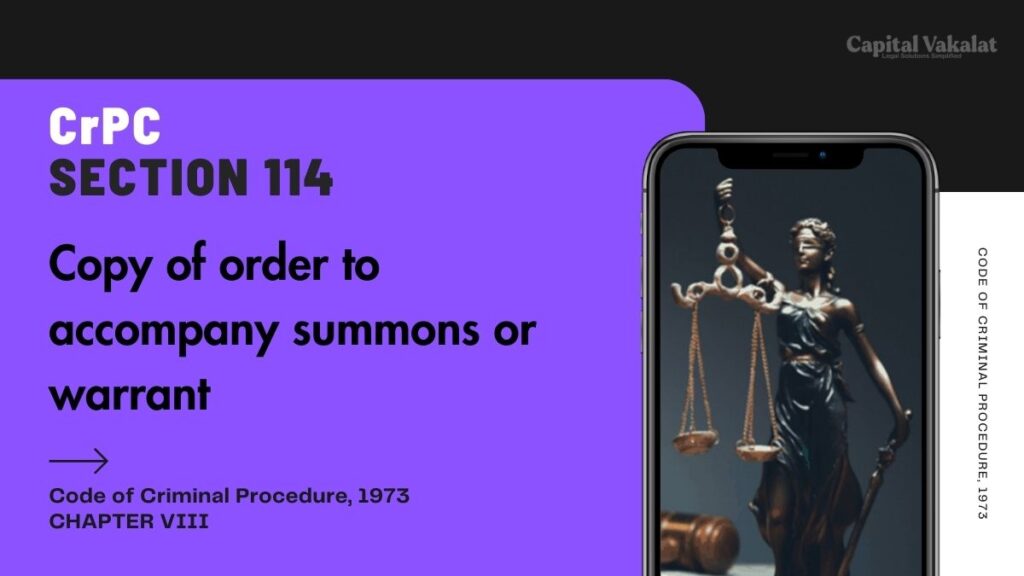Navigating the intricacies of criminal procedure can be challenging, particularly when it comes to the provisions outlined in the Code of Criminal Procedure (CrPC). Among these provisions, Section 114 CrPC holds significant importance as it mandates the accompaniment of a copy of the order with any summons or warrant issued.

This requirement ensures transparency and clarity in legal processes, enhancing the overall effectiveness of judicial proceedings.
Bare Act. Section 114 Cr.P.C.
Copy of order to accompany summons or warrant.
Every summons or warrant issued under section 113 shall be accompanied by a copy of the order made under section 111, and such copy shall be delivered by the officer serving or executing such summons or warrant to the person served with, or arrested under, the same.
Understanding Section 114 CrPC
Section 114 CrPC dictates that whenever a summons or warrant is issued, it must be accompanied by a copy of the order that prompted its issuance. This section is designed to safeguard the rights of the individual being summoned or arrested, ensuring they are fully aware of the reasons behind the legal action taken against them. By mandating this practice, the CrPC promotes transparency and accountability within the legal system.
Importance of Accompanying Orders with Summons or Warrants
The inclusion of a copy of the order with a summons or warrant serves multiple crucial purposes:
- Ensuring Clarity: It provides the recipient with a clear understanding of the allegations or charges they are facing.
- Legal Compliance: It ensures that the authorities issuing the summons or warrant are acting within the boundaries of the law.
- Safeguarding Rights: It protects the fundamental rights of the individual by informing them of the legal basis for the action taken against them.
Procedure for Issuing Summons or Warrants
The process of issuing a summons or warrant involves several steps to ensure compliance with Section 114 CrPC:
- Issuance of Order: The judicial authority must first issue an order detailing the reasons for the summons or warrant.
- Preparation of Documents: A copy of this order must be prepared and attached to the summons or warrant.
- Delivery: The summons or warrant, along with the attached order, is then delivered to the relevant parties, ensuring that they are fully informed.
Legal Implications of Non-Compliance
Failure to comply with Section 114 CrPC can have significant legal repercussions:
- Invalidation of Summons/Warrant: A summons or warrant issued without an accompanying order may be deemed invalid.
- Legal Challenges: The recipient may challenge the summons or warrant in court, potentially leading to delays in the judicial process.
- Accountability Issues: Authorities may face scrutiny and accountability for not adhering to the procedural requirements.
Case Studies Highlighting Section 114 CrPC
Several judicial precedents underscore the importance of adhering to Section 114 CrPC:
- Case Study 1: In a landmark judgment, the Supreme Court invalidated a warrant issued without the accompanying order, emphasizing the necessity of this procedural requirement.
- Case Study 2: A high court highlighted the protection of individual rights by reinforcing that a summons without a copy of the order failed to meet legal standards, leading to the quashing of the summons.
Best Practices for Legal Practitioners
Legal practitioners must ensure strict adherence to Section 114 CrPC to uphold the integrity of judicial processes:
- Diligence in Documentation: Ensure all necessary documents, including the order, are properly prepared and attached.
- Verification: Double-check that the summons or warrant and the accompanying order are correctly delivered to the recipient.
- Awareness and Training: Regularly update legal teams on the importance of compliance with Section 114 CrPC to avoid procedural lapses.
Conclusion
Section 114 CrPC is a vital provision that reinforces the principles of transparency, accountability, and protection of individual rights within the criminal justice system. By mandating the accompaniment of a copy of the order with summons or warrants, it ensures that all parties are fully informed of the legal actions being taken, thereby fostering trust and integrity in judicial proceedings. Legal practitioners and authorities must prioritize adherence to this section to maintain the credibility and effectiveness of the legal process.
Frequently Asked Questions
Why is it important to attach a copy of the order with a summons or warrant?
Attaching a copy of the order ensures clarity, legal compliance, and protection of the individual’s rights by informing them of the reasons behind the legal action.
What happens if a summons or warrant is issued without an accompanying order?
If a summons or warrant is issued without an accompanying order, it may be deemed invalid and can be legally challenged, potentially delaying the judicial process.
Are there any notable cases related to Section 114 CrPC?
Yes, several judicial precedents highlight the importance of this section, including cases where warrants were invalidated due to the absence of an accompanying order.
How can legal practitioners ensure compliance with Section 114 CrPC?
Legal practitioners should diligently prepare and attach all necessary documents, verify their proper delivery, and regularly update their teams on the importance of compliance with this section.
What are the legal implications of non-compliance with Section 114 CrPC?
Non-compliance can lead to the invalidation of summons or warrants, legal challenges, and scrutiny of the authorities for procedural lapses.